Discharge and Self-management of Colorectal Cancer
VerifiedAdded on 2023/06/12
|9
|2603
|261
AI Summary
This article discusses the discharge and self-management plan for colorectal cancer patients. It covers the recommended follow-up regime, education, and self-management plan. The article also identifies the principles of effective communication strategies that the coordinator will use to ensure that John understands how the follow-up regime is going to take place effectively.
Contribute Materials
Your contribution can guide someone’s learning journey. Share your
documents today.
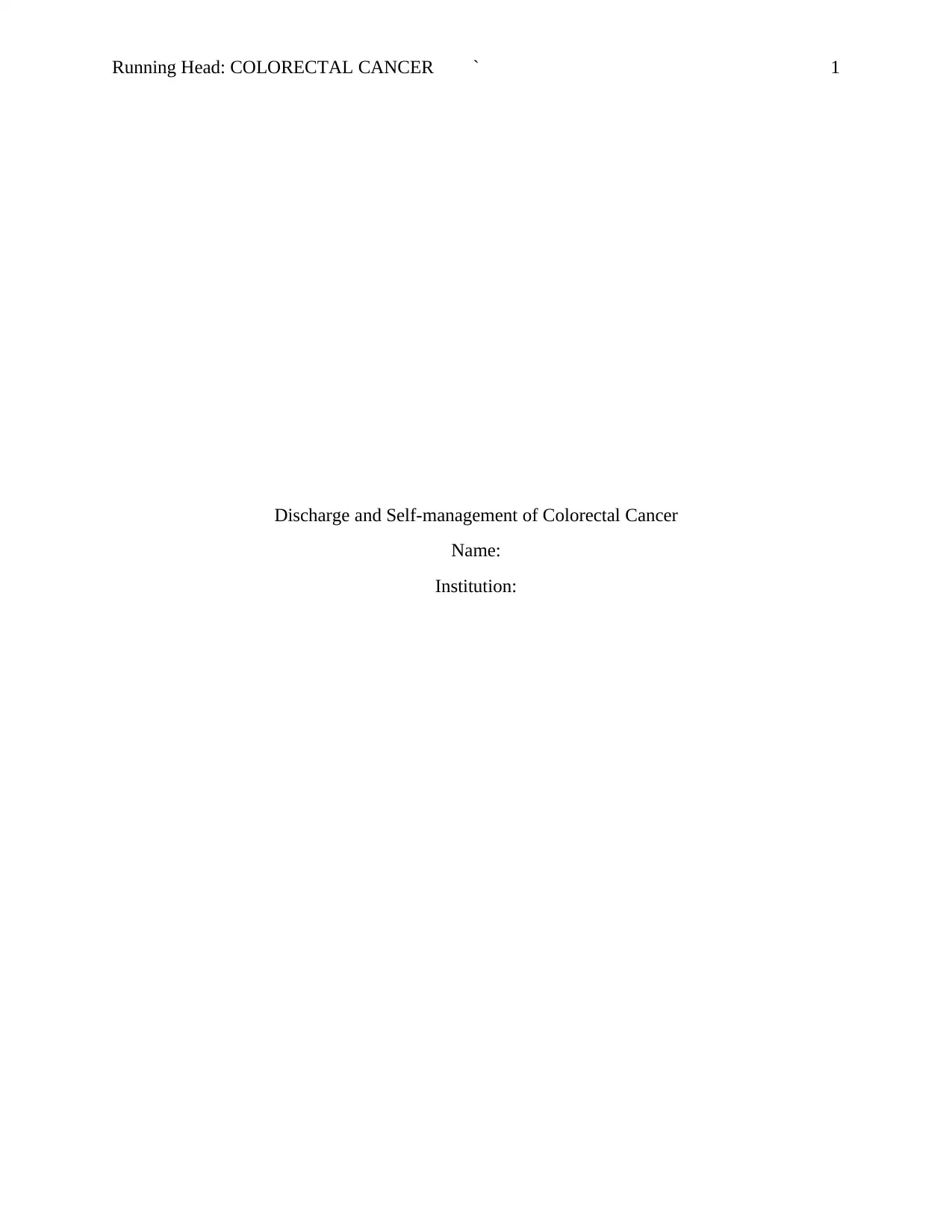
Running Head: COLORECTAL CANCER ` 1
Discharge and Self-management of Colorectal Cancer
Name:
Institution:
Discharge and Self-management of Colorectal Cancer
Name:
Institution:
Secure Best Marks with AI Grader
Need help grading? Try our AI Grader for instant feedback on your assignments.

Discharge and Self-management Plan of Colorectal Cancer 2
Introduction
John started his health kick on his 65th birthday though he did not get involved in any
particular sport and never did do any regular exercises. Moreover, John did not have a healthy
eating habit because most of the weekends he spent time with his friends drinking a few beers
and eating a lot of beef content with was rarely backed up by greens. After John got diagnosed,
he suffered from a high anterior resection which he acquired after colorectal cancer got located
in his colonoscopy which involves the evaluation of the inside of the colon. Furthermore, John
had the history of ACPS B which was poorly differentiated from the adenocarcinoma infiltrating
the serosa. Also, John admits that he had experienced pains and he felt tired frequently. This
article also provides information regarding the discharge plan John can follow after leaving the
hospital and the self-management plan he can follow to ensure that he fully completes his active
treatment.
Discharge Plan
The Recommended Follow up Regime
According to Jorgensen (2015), most of the follow-up regime gets recommended for
patients who have received curative resection for stages 2 and stage 3 diseases; this puts John at
risk of acquiring Primary Colorectal Cancer and adenomatous polyps. Hence, there are
possibilities that John may develop a new primary cancer and adenomas which may reoccur after
about four years. Furthermore, the follow-up regime is crucial because it would help John
maintain a good healthy life which manages the side effects of the chemotherapy. In the follow-
up regime, it is essential for John to receive the history and physical examination from a
physician at regular intervals to establish the symptoms of colorectal cancer recurrence.
Furthermore, the digital rectal exam is also done on selected patients to develop rectal cancer. It
Introduction
John started his health kick on his 65th birthday though he did not get involved in any
particular sport and never did do any regular exercises. Moreover, John did not have a healthy
eating habit because most of the weekends he spent time with his friends drinking a few beers
and eating a lot of beef content with was rarely backed up by greens. After John got diagnosed,
he suffered from a high anterior resection which he acquired after colorectal cancer got located
in his colonoscopy which involves the evaluation of the inside of the colon. Furthermore, John
had the history of ACPS B which was poorly differentiated from the adenocarcinoma infiltrating
the serosa. Also, John admits that he had experienced pains and he felt tired frequently. This
article also provides information regarding the discharge plan John can follow after leaving the
hospital and the self-management plan he can follow to ensure that he fully completes his active
treatment.
Discharge Plan
The Recommended Follow up Regime
According to Jorgensen (2015), most of the follow-up regime gets recommended for
patients who have received curative resection for stages 2 and stage 3 diseases; this puts John at
risk of acquiring Primary Colorectal Cancer and adenomatous polyps. Hence, there are
possibilities that John may develop a new primary cancer and adenomas which may reoccur after
about four years. Furthermore, the follow-up regime is crucial because it would help John
maintain a good healthy life which manages the side effects of the chemotherapy. In the follow-
up regime, it is essential for John to receive the history and physical examination from a
physician at regular intervals to establish the symptoms of colorectal cancer recurrence.
Furthermore, the digital rectal exam is also done on selected patients to develop rectal cancer. It
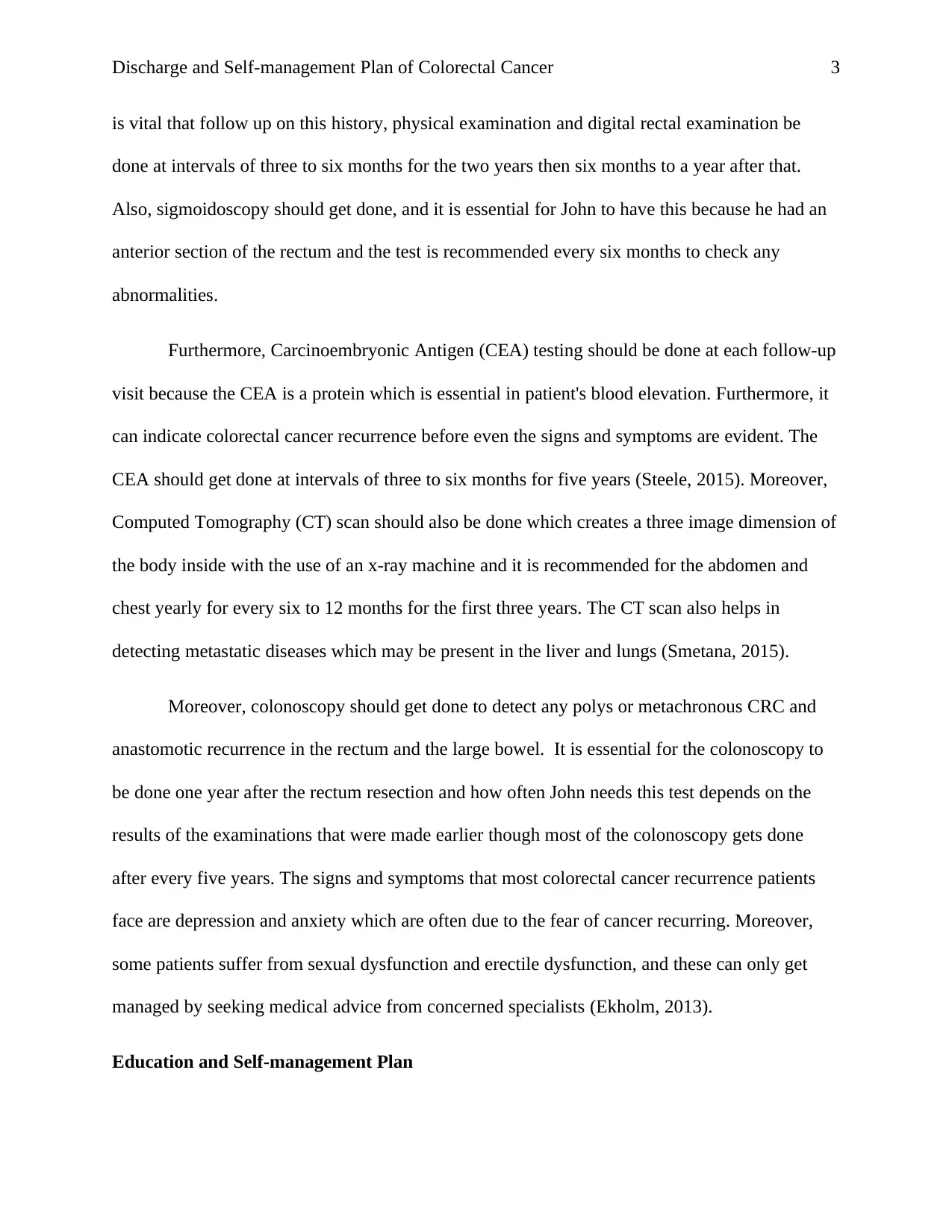
Discharge and Self-management Plan of Colorectal Cancer 3
is vital that follow up on this history, physical examination and digital rectal examination be
done at intervals of three to six months for the two years then six months to a year after that.
Also, sigmoidoscopy should get done, and it is essential for John to have this because he had an
anterior section of the rectum and the test is recommended every six months to check any
abnormalities.
Furthermore, Carcinoembryonic Antigen (CEA) testing should be done at each follow-up
visit because the CEA is a protein which is essential in patient's blood elevation. Furthermore, it
can indicate colorectal cancer recurrence before even the signs and symptoms are evident. The
CEA should get done at intervals of three to six months for five years (Steele, 2015). Moreover,
Computed Tomography (CT) scan should also be done which creates a three image dimension of
the body inside with the use of an x-ray machine and it is recommended for the abdomen and
chest yearly for every six to 12 months for the first three years. The CT scan also helps in
detecting metastatic diseases which may be present in the liver and lungs (Smetana, 2015).
Moreover, colonoscopy should get done to detect any polys or metachronous CRC and
anastomotic recurrence in the rectum and the large bowel. It is essential for the colonoscopy to
be done one year after the rectum resection and how often John needs this test depends on the
results of the examinations that were made earlier though most of the colonoscopy gets done
after every five years. The signs and symptoms that most colorectal cancer recurrence patients
face are depression and anxiety which are often due to the fear of cancer recurring. Moreover,
some patients suffer from sexual dysfunction and erectile dysfunction, and these can only get
managed by seeking medical advice from concerned specialists (Ekholm, 2013).
Education and Self-management Plan
is vital that follow up on this history, physical examination and digital rectal examination be
done at intervals of three to six months for the two years then six months to a year after that.
Also, sigmoidoscopy should get done, and it is essential for John to have this because he had an
anterior section of the rectum and the test is recommended every six months to check any
abnormalities.
Furthermore, Carcinoembryonic Antigen (CEA) testing should be done at each follow-up
visit because the CEA is a protein which is essential in patient's blood elevation. Furthermore, it
can indicate colorectal cancer recurrence before even the signs and symptoms are evident. The
CEA should get done at intervals of three to six months for five years (Steele, 2015). Moreover,
Computed Tomography (CT) scan should also be done which creates a three image dimension of
the body inside with the use of an x-ray machine and it is recommended for the abdomen and
chest yearly for every six to 12 months for the first three years. The CT scan also helps in
detecting metastatic diseases which may be present in the liver and lungs (Smetana, 2015).
Moreover, colonoscopy should get done to detect any polys or metachronous CRC and
anastomotic recurrence in the rectum and the large bowel. It is essential for the colonoscopy to
be done one year after the rectum resection and how often John needs this test depends on the
results of the examinations that were made earlier though most of the colonoscopy gets done
after every five years. The signs and symptoms that most colorectal cancer recurrence patients
face are depression and anxiety which are often due to the fear of cancer recurring. Moreover,
some patients suffer from sexual dysfunction and erectile dysfunction, and these can only get
managed by seeking medical advice from concerned specialists (Ekholm, 2013).
Education and Self-management Plan
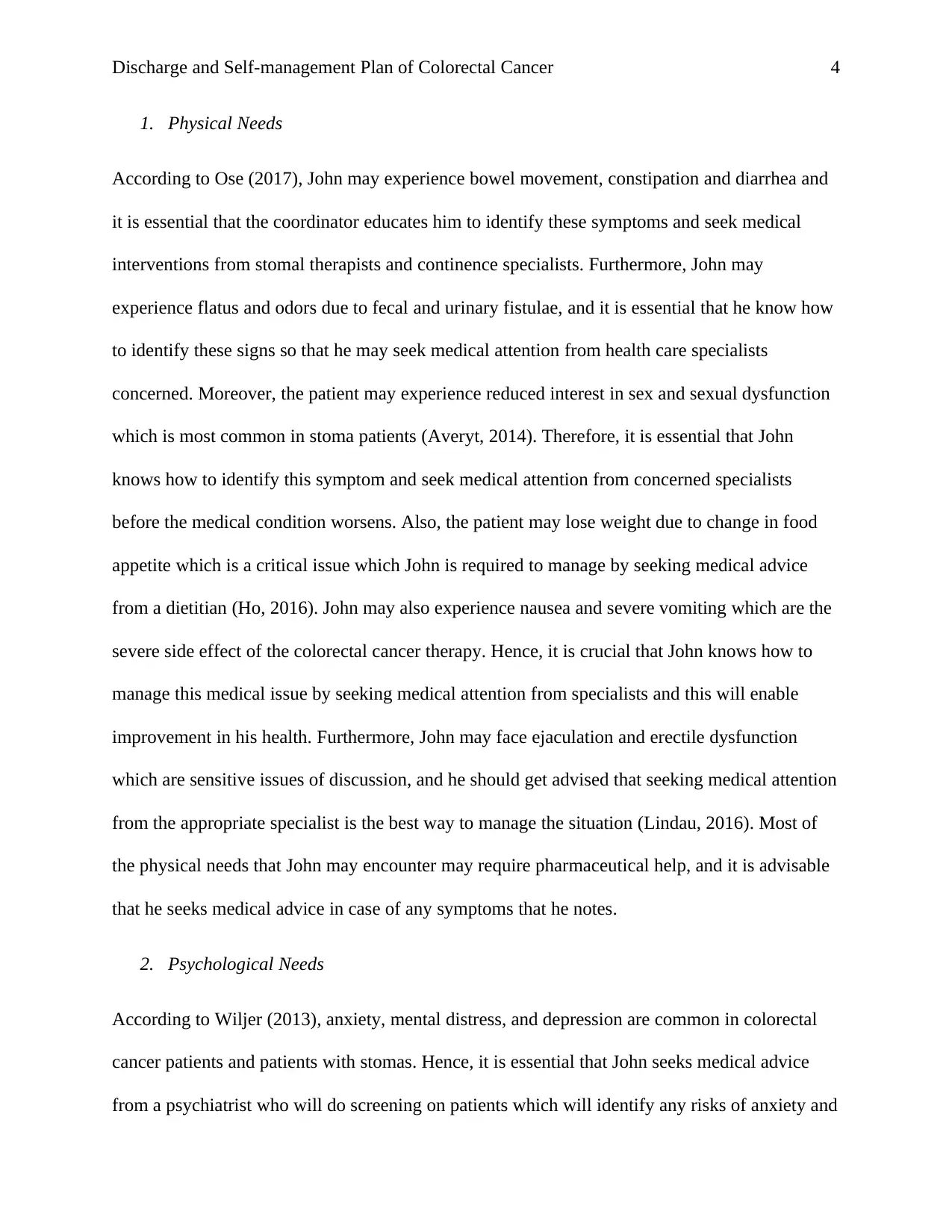
Discharge and Self-management Plan of Colorectal Cancer 4
1. Physical Needs
According to Ose (2017), John may experience bowel movement, constipation and diarrhea and
it is essential that the coordinator educates him to identify these symptoms and seek medical
interventions from stomal therapists and continence specialists. Furthermore, John may
experience flatus and odors due to fecal and urinary fistulae, and it is essential that he know how
to identify these signs so that he may seek medical attention from health care specialists
concerned. Moreover, the patient may experience reduced interest in sex and sexual dysfunction
which is most common in stoma patients (Averyt, 2014). Therefore, it is essential that John
knows how to identify this symptom and seek medical attention from concerned specialists
before the medical condition worsens. Also, the patient may lose weight due to change in food
appetite which is a critical issue which John is required to manage by seeking medical advice
from a dietitian (Ho, 2016). John may also experience nausea and severe vomiting which are the
severe side effect of the colorectal cancer therapy. Hence, it is crucial that John knows how to
manage this medical issue by seeking medical attention from specialists and this will enable
improvement in his health. Furthermore, John may face ejaculation and erectile dysfunction
which are sensitive issues of discussion, and he should get advised that seeking medical attention
from the appropriate specialist is the best way to manage the situation (Lindau, 2016). Most of
the physical needs that John may encounter may require pharmaceutical help, and it is advisable
that he seeks medical advice in case of any symptoms that he notes.
2. Psychological Needs
According to Wiljer (2013), anxiety, mental distress, and depression are common in colorectal
cancer patients and patients with stomas. Hence, it is essential that John seeks medical advice
from a psychiatrist who will do screening on patients which will identify any risks of anxiety and
1. Physical Needs
According to Ose (2017), John may experience bowel movement, constipation and diarrhea and
it is essential that the coordinator educates him to identify these symptoms and seek medical
interventions from stomal therapists and continence specialists. Furthermore, John may
experience flatus and odors due to fecal and urinary fistulae, and it is essential that he know how
to identify these signs so that he may seek medical attention from health care specialists
concerned. Moreover, the patient may experience reduced interest in sex and sexual dysfunction
which is most common in stoma patients (Averyt, 2014). Therefore, it is essential that John
knows how to identify this symptom and seek medical attention from concerned specialists
before the medical condition worsens. Also, the patient may lose weight due to change in food
appetite which is a critical issue which John is required to manage by seeking medical advice
from a dietitian (Ho, 2016). John may also experience nausea and severe vomiting which are the
severe side effect of the colorectal cancer therapy. Hence, it is crucial that John knows how to
manage this medical issue by seeking medical attention from specialists and this will enable
improvement in his health. Furthermore, John may face ejaculation and erectile dysfunction
which are sensitive issues of discussion, and he should get advised that seeking medical attention
from the appropriate specialist is the best way to manage the situation (Lindau, 2016). Most of
the physical needs that John may encounter may require pharmaceutical help, and it is advisable
that he seeks medical advice in case of any symptoms that he notes.
2. Psychological Needs
According to Wiljer (2013), anxiety, mental distress, and depression are common in colorectal
cancer patients and patients with stomas. Hence, it is essential that John seeks medical advice
from a psychiatrist who will do screening on patients which will identify any risks of anxiety and
Secure Best Marks with AI Grader
Need help grading? Try our AI Grader for instant feedback on your assignments.
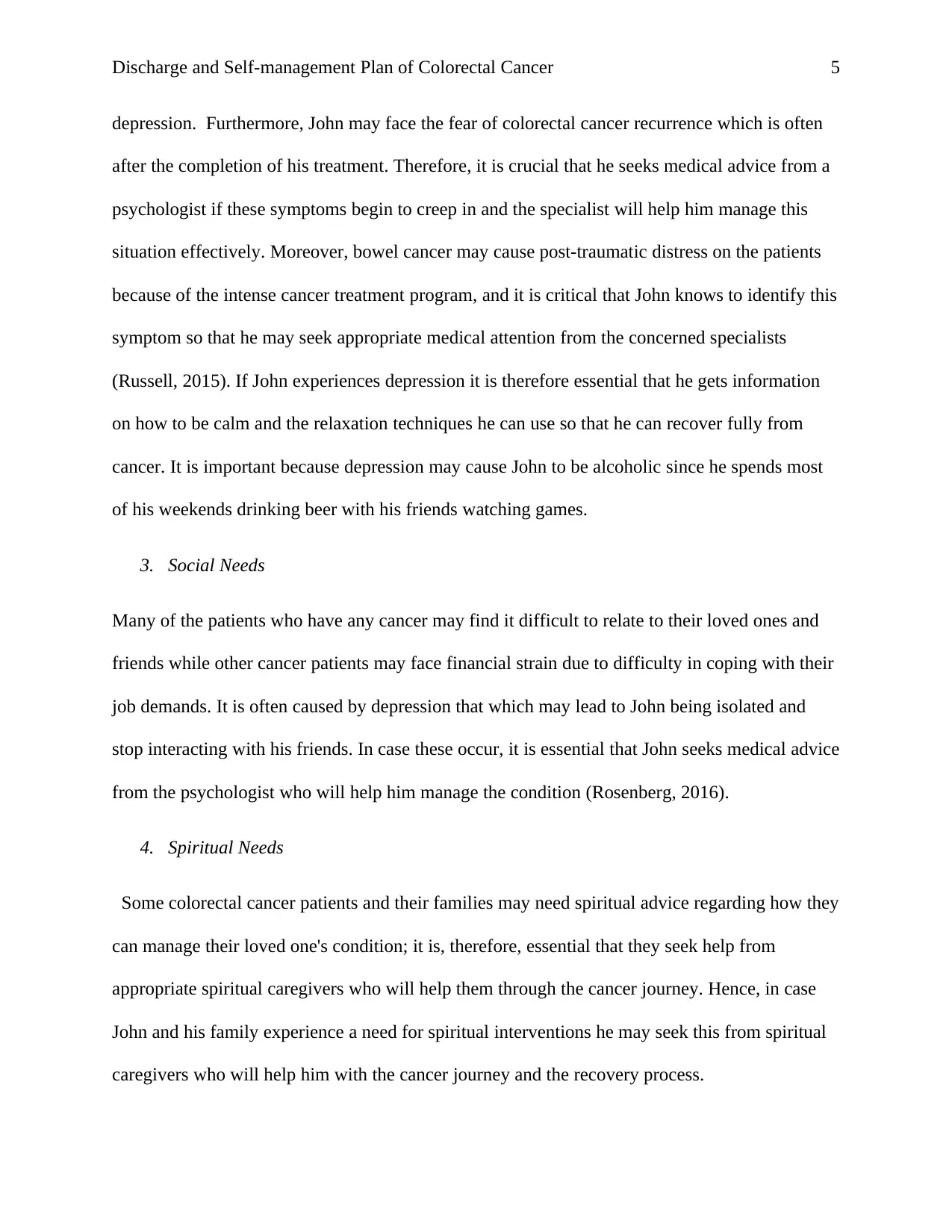
Discharge and Self-management Plan of Colorectal Cancer 5
depression. Furthermore, John may face the fear of colorectal cancer recurrence which is often
after the completion of his treatment. Therefore, it is crucial that he seeks medical advice from a
psychologist if these symptoms begin to creep in and the specialist will help him manage this
situation effectively. Moreover, bowel cancer may cause post-traumatic distress on the patients
because of the intense cancer treatment program, and it is critical that John knows to identify this
symptom so that he may seek appropriate medical attention from the concerned specialists
(Russell, 2015). If John experiences depression it is therefore essential that he gets information
on how to be calm and the relaxation techniques he can use so that he can recover fully from
cancer. It is important because depression may cause John to be alcoholic since he spends most
of his weekends drinking beer with his friends watching games.
3. Social Needs
Many of the patients who have any cancer may find it difficult to relate to their loved ones and
friends while other cancer patients may face financial strain due to difficulty in coping with their
job demands. It is often caused by depression that which may lead to John being isolated and
stop interacting with his friends. In case these occur, it is essential that John seeks medical advice
from the psychologist who will help him manage the condition (Rosenberg, 2016).
4. Spiritual Needs
Some colorectal cancer patients and their families may need spiritual advice regarding how they
can manage their loved one's condition; it is, therefore, essential that they seek help from
appropriate spiritual caregivers who will help them through the cancer journey. Hence, in case
John and his family experience a need for spiritual interventions he may seek this from spiritual
caregivers who will help him with the cancer journey and the recovery process.
depression. Furthermore, John may face the fear of colorectal cancer recurrence which is often
after the completion of his treatment. Therefore, it is crucial that he seeks medical advice from a
psychologist if these symptoms begin to creep in and the specialist will help him manage this
situation effectively. Moreover, bowel cancer may cause post-traumatic distress on the patients
because of the intense cancer treatment program, and it is critical that John knows to identify this
symptom so that he may seek appropriate medical attention from the concerned specialists
(Russell, 2015). If John experiences depression it is therefore essential that he gets information
on how to be calm and the relaxation techniques he can use so that he can recover fully from
cancer. It is important because depression may cause John to be alcoholic since he spends most
of his weekends drinking beer with his friends watching games.
3. Social Needs
Many of the patients who have any cancer may find it difficult to relate to their loved ones and
friends while other cancer patients may face financial strain due to difficulty in coping with their
job demands. It is often caused by depression that which may lead to John being isolated and
stop interacting with his friends. In case these occur, it is essential that John seeks medical advice
from the psychologist who will help him manage the condition (Rosenberg, 2016).
4. Spiritual Needs
Some colorectal cancer patients and their families may need spiritual advice regarding how they
can manage their loved one's condition; it is, therefore, essential that they seek help from
appropriate spiritual caregivers who will help them through the cancer journey. Hence, in case
John and his family experience a need for spiritual interventions he may seek this from spiritual
caregivers who will help him with the cancer journey and the recovery process.
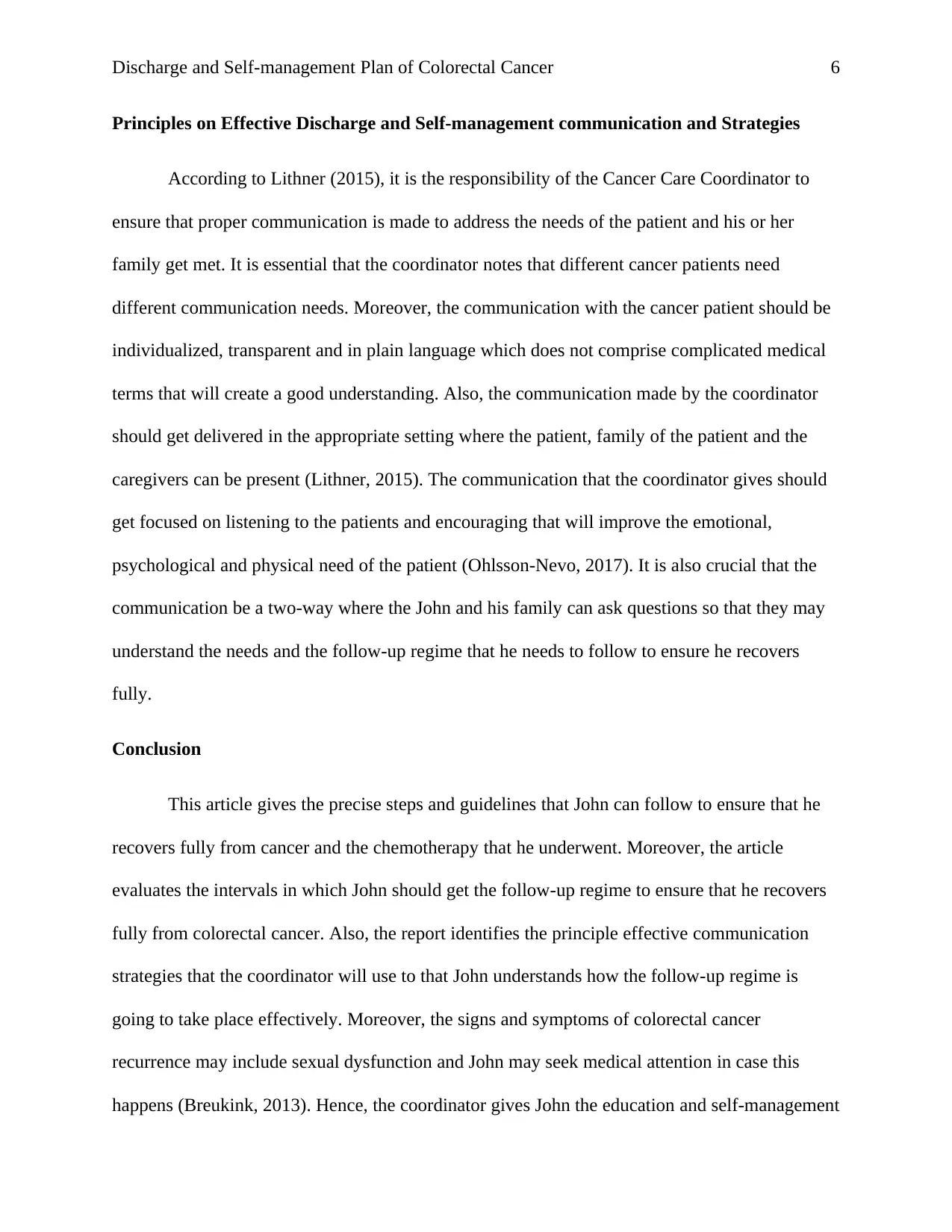
Discharge and Self-management Plan of Colorectal Cancer 6
Principles on Effective Discharge and Self-management communication and Strategies
According to Lithner (2015), it is the responsibility of the Cancer Care Coordinator to
ensure that proper communication is made to address the needs of the patient and his or her
family get met. It is essential that the coordinator notes that different cancer patients need
different communication needs. Moreover, the communication with the cancer patient should be
individualized, transparent and in plain language which does not comprise complicated medical
terms that will create a good understanding. Also, the communication made by the coordinator
should get delivered in the appropriate setting where the patient, family of the patient and the
caregivers can be present (Lithner, 2015). The communication that the coordinator gives should
get focused on listening to the patients and encouraging that will improve the emotional,
psychological and physical need of the patient (Ohlsson-Nevo, 2017). It is also crucial that the
communication be a two-way where the John and his family can ask questions so that they may
understand the needs and the follow-up regime that he needs to follow to ensure he recovers
fully.
Conclusion
This article gives the precise steps and guidelines that John can follow to ensure that he
recovers fully from cancer and the chemotherapy that he underwent. Moreover, the article
evaluates the intervals in which John should get the follow-up regime to ensure that he recovers
fully from colorectal cancer. Also, the report identifies the principle effective communication
strategies that the coordinator will use to that John understands how the follow-up regime is
going to take place effectively. Moreover, the signs and symptoms of colorectal cancer
recurrence may include sexual dysfunction and John may seek medical attention in case this
happens (Breukink, 2013). Hence, the coordinator gives John the education and self-management
Principles on Effective Discharge and Self-management communication and Strategies
According to Lithner (2015), it is the responsibility of the Cancer Care Coordinator to
ensure that proper communication is made to address the needs of the patient and his or her
family get met. It is essential that the coordinator notes that different cancer patients need
different communication needs. Moreover, the communication with the cancer patient should be
individualized, transparent and in plain language which does not comprise complicated medical
terms that will create a good understanding. Also, the communication made by the coordinator
should get delivered in the appropriate setting where the patient, family of the patient and the
caregivers can be present (Lithner, 2015). The communication that the coordinator gives should
get focused on listening to the patients and encouraging that will improve the emotional,
psychological and physical need of the patient (Ohlsson-Nevo, 2017). It is also crucial that the
communication be a two-way where the John and his family can ask questions so that they may
understand the needs and the follow-up regime that he needs to follow to ensure he recovers
fully.
Conclusion
This article gives the precise steps and guidelines that John can follow to ensure that he
recovers fully from cancer and the chemotherapy that he underwent. Moreover, the article
evaluates the intervals in which John should get the follow-up regime to ensure that he recovers
fully from colorectal cancer. Also, the report identifies the principle effective communication
strategies that the coordinator will use to that John understands how the follow-up regime is
going to take place effectively. Moreover, the signs and symptoms of colorectal cancer
recurrence may include sexual dysfunction and John may seek medical attention in case this
happens (Breukink, 2013). Hence, the coordinator gives John the education and self-management

Discharge and Self-management Plan of Colorectal Cancer 7
plan that will help him identify potential side effects and treatment he may seek in case any of
the signs arise. Also, the Fecal Occult Blood Test (FOBT) plays a crucial role in remaining
contentious with the optimal schedule, and are not recommended routinely.
plan that will help him identify potential side effects and treatment he may seek in case any of
the signs arise. Also, the Fecal Occult Blood Test (FOBT) plays a crucial role in remaining
contentious with the optimal schedule, and are not recommended routinely.
Paraphrase This Document
Need a fresh take? Get an instant paraphrase of this document with our AI Paraphraser
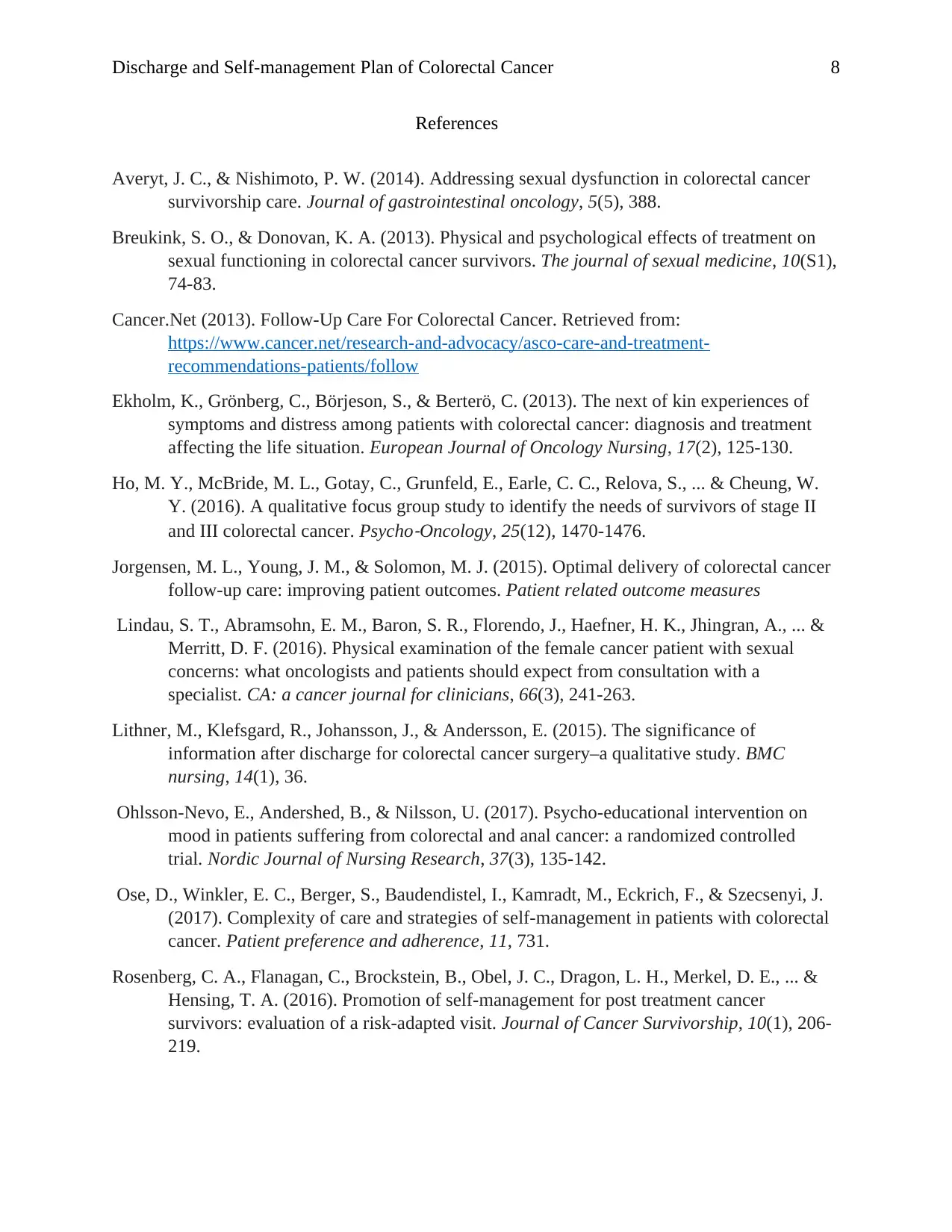
Discharge and Self-management Plan of Colorectal Cancer 8
References
Averyt, J. C., & Nishimoto, P. W. (2014). Addressing sexual dysfunction in colorectal cancer
survivorship care. Journal of gastrointestinal oncology, 5(5), 388.
Breukink, S. O., & Donovan, K. A. (2013). Physical and psychological effects of treatment on
sexual functioning in colorectal cancer survivors. The journal of sexual medicine, 10(S1),
74-83.
Cancer.Net (2013). Follow-Up Care For Colorectal Cancer. Retrieved from:
https://www.cancer.net/research-and-advocacy/asco-care-and-treatment-
recommendations-patients/follow
Ekholm, K., Grönberg, C., Börjeson, S., & Berterö, C. (2013). The next of kin experiences of
symptoms and distress among patients with colorectal cancer: diagnosis and treatment
affecting the life situation. European Journal of Oncology Nursing, 17(2), 125-130.
Ho, M. Y., McBride, M. L., Gotay, C., Grunfeld, E., Earle, C. C., Relova, S., ... & Cheung, W.
Y. (2016). A qualitative focus group study to identify the needs of survivors of stage II
and III colorectal cancer. Psycho
‐Oncology, 25(12), 1470-1476.
Jorgensen, M. L., Young, J. M., & Solomon, M. J. (2015). Optimal delivery of colorectal cancer
follow-up care: improving patient outcomes. Patient related outcome measures
Lindau, S. T., Abramsohn, E. M., Baron, S. R., Florendo, J., Haefner, H. K., Jhingran, A., ... &
Merritt, D. F. (2016). Physical examination of the female cancer patient with sexual
concerns: what oncologists and patients should expect from consultation with a
specialist. CA: a cancer journal for clinicians, 66(3), 241-263.
Lithner, M., Klefsgard, R., Johansson, J., & Andersson, E. (2015). The significance of
information after discharge for colorectal cancer surgery–a qualitative study. BMC
nursing, 14(1), 36.
Ohlsson-Nevo, E., Andershed, B., & Nilsson, U. (2017). Psycho-educational intervention on
mood in patients suffering from colorectal and anal cancer: a randomized controlled
trial. Nordic Journal of Nursing Research, 37(3), 135-142.
Ose, D., Winkler, E. C., Berger, S., Baudendistel, I., Kamradt, M., Eckrich, F., & Szecsenyi, J.
(2017). Complexity of care and strategies of self-management in patients with colorectal
cancer. Patient preference and adherence, 11, 731.
Rosenberg, C. A., Flanagan, C., Brockstein, B., Obel, J. C., Dragon, L. H., Merkel, D. E., ... &
Hensing, T. A. (2016). Promotion of self-management for post treatment cancer
survivors: evaluation of a risk-adapted visit. Journal of Cancer Survivorship, 10(1), 206-
219.
References
Averyt, J. C., & Nishimoto, P. W. (2014). Addressing sexual dysfunction in colorectal cancer
survivorship care. Journal of gastrointestinal oncology, 5(5), 388.
Breukink, S. O., & Donovan, K. A. (2013). Physical and psychological effects of treatment on
sexual functioning in colorectal cancer survivors. The journal of sexual medicine, 10(S1),
74-83.
Cancer.Net (2013). Follow-Up Care For Colorectal Cancer. Retrieved from:
https://www.cancer.net/research-and-advocacy/asco-care-and-treatment-
recommendations-patients/follow
Ekholm, K., Grönberg, C., Börjeson, S., & Berterö, C. (2013). The next of kin experiences of
symptoms and distress among patients with colorectal cancer: diagnosis and treatment
affecting the life situation. European Journal of Oncology Nursing, 17(2), 125-130.
Ho, M. Y., McBride, M. L., Gotay, C., Grunfeld, E., Earle, C. C., Relova, S., ... & Cheung, W.
Y. (2016). A qualitative focus group study to identify the needs of survivors of stage II
and III colorectal cancer. Psycho
‐Oncology, 25(12), 1470-1476.
Jorgensen, M. L., Young, J. M., & Solomon, M. J. (2015). Optimal delivery of colorectal cancer
follow-up care: improving patient outcomes. Patient related outcome measures
Lindau, S. T., Abramsohn, E. M., Baron, S. R., Florendo, J., Haefner, H. K., Jhingran, A., ... &
Merritt, D. F. (2016). Physical examination of the female cancer patient with sexual
concerns: what oncologists and patients should expect from consultation with a
specialist. CA: a cancer journal for clinicians, 66(3), 241-263.
Lithner, M., Klefsgard, R., Johansson, J., & Andersson, E. (2015). The significance of
information after discharge for colorectal cancer surgery–a qualitative study. BMC
nursing, 14(1), 36.
Ohlsson-Nevo, E., Andershed, B., & Nilsson, U. (2017). Psycho-educational intervention on
mood in patients suffering from colorectal and anal cancer: a randomized controlled
trial. Nordic Journal of Nursing Research, 37(3), 135-142.
Ose, D., Winkler, E. C., Berger, S., Baudendistel, I., Kamradt, M., Eckrich, F., & Szecsenyi, J.
(2017). Complexity of care and strategies of self-management in patients with colorectal
cancer. Patient preference and adherence, 11, 731.
Rosenberg, C. A., Flanagan, C., Brockstein, B., Obel, J. C., Dragon, L. H., Merkel, D. E., ... &
Hensing, T. A. (2016). Promotion of self-management for post treatment cancer
survivors: evaluation of a risk-adapted visit. Journal of Cancer Survivorship, 10(1), 206-
219.
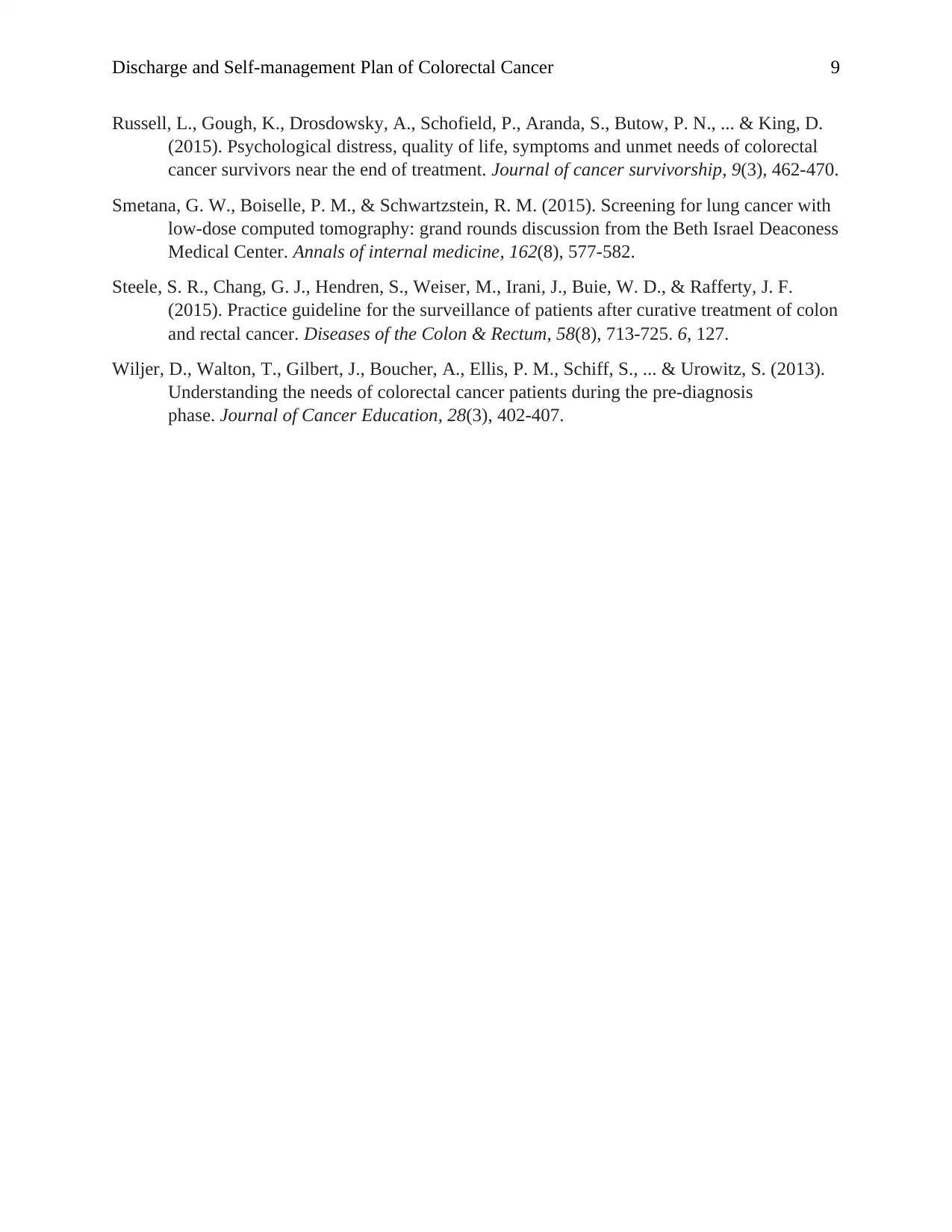
Discharge and Self-management Plan of Colorectal Cancer 9
Russell, L., Gough, K., Drosdowsky, A., Schofield, P., Aranda, S., Butow, P. N., ... & King, D.
(2015). Psychological distress, quality of life, symptoms and unmet needs of colorectal
cancer survivors near the end of treatment. Journal of cancer survivorship, 9(3), 462-470.
Smetana, G. W., Boiselle, P. M., & Schwartzstein, R. M. (2015). Screening for lung cancer with
low-dose computed tomography: grand rounds discussion from the Beth Israel Deaconess
Medical Center. Annals of internal medicine, 162(8), 577-582.
Steele, S. R., Chang, G. J., Hendren, S., Weiser, M., Irani, J., Buie, W. D., & Rafferty, J. F.
(2015). Practice guideline for the surveillance of patients after curative treatment of colon
and rectal cancer. Diseases of the Colon & Rectum, 58(8), 713-725. 6, 127.
Wiljer, D., Walton, T., Gilbert, J., Boucher, A., Ellis, P. M., Schiff, S., ... & Urowitz, S. (2013).
Understanding the needs of colorectal cancer patients during the pre-diagnosis
phase. Journal of Cancer Education, 28(3), 402-407.
Russell, L., Gough, K., Drosdowsky, A., Schofield, P., Aranda, S., Butow, P. N., ... & King, D.
(2015). Psychological distress, quality of life, symptoms and unmet needs of colorectal
cancer survivors near the end of treatment. Journal of cancer survivorship, 9(3), 462-470.
Smetana, G. W., Boiselle, P. M., & Schwartzstein, R. M. (2015). Screening for lung cancer with
low-dose computed tomography: grand rounds discussion from the Beth Israel Deaconess
Medical Center. Annals of internal medicine, 162(8), 577-582.
Steele, S. R., Chang, G. J., Hendren, S., Weiser, M., Irani, J., Buie, W. D., & Rafferty, J. F.
(2015). Practice guideline for the surveillance of patients after curative treatment of colon
and rectal cancer. Diseases of the Colon & Rectum, 58(8), 713-725. 6, 127.
Wiljer, D., Walton, T., Gilbert, J., Boucher, A., Ellis, P. M., Schiff, S., ... & Urowitz, S. (2013).
Understanding the needs of colorectal cancer patients during the pre-diagnosis
phase. Journal of Cancer Education, 28(3), 402-407.
1 out of 9
Related Documents
Your All-in-One AI-Powered Toolkit for Academic Success.
+13062052269
info@desklib.com
Available 24*7 on WhatsApp / Email
![[object Object]](/_next/static/media/star-bottom.7253800d.svg)
Unlock your academic potential
© 2024 | Zucol Services PVT LTD | All rights reserved.




